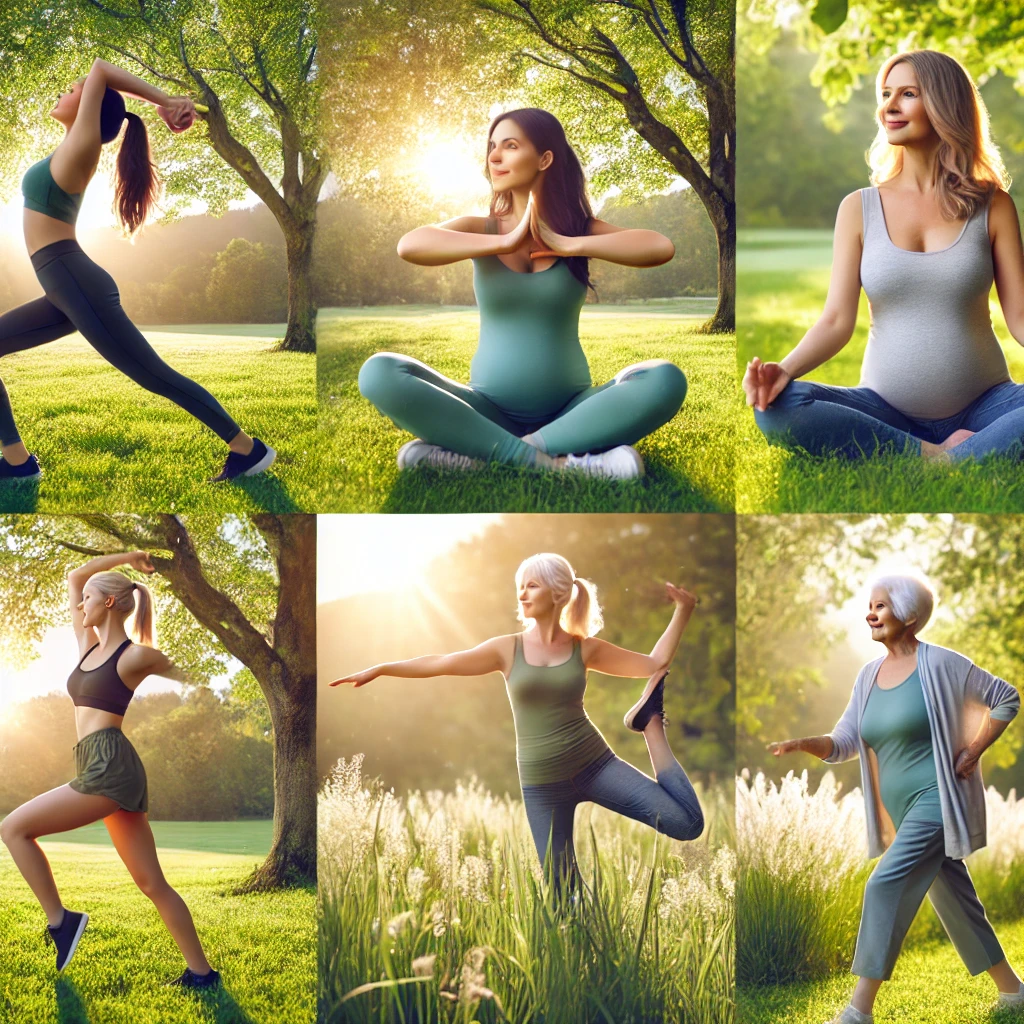Table of Contents
Understanding the Importance of Adapting Workout Routines
Adapting workout routines to the various life stages of women is essential for ensuring optimal health, physical fitness, and well-being. Each phase of life, including adolescence, pregnancy, postpartum, and menopause, brings unique challenges and changes that impact a woman’s body, energy levels, and overall fitness needs. For instance, during adolescence, a young woman’s body undergoes significant hormonal changes that can influence her strength and endurance. Tailoring workouts to accommodate these shifts is crucial for fostering a positive relationship with fitness early on.

As women progress into pregnancy, they experience profound physiological changes that require tailored fitness regimens. Exercise during this stage not only supports physical health but can also alleviate common discomforts, such as back pain and fatigue. Moreover, after childbirth, the postpartum period demands yet another adjustment in workout routines. New mothers often face challenges like hormonal fluctuations and varying energy levels, necessitating specialized approaches to ensure safety and effectiveness in their fitness journey.
Furthermore, menopause introduces a range of changes, including shifts in metabolism and increases in body fat. This period may also come with decreased bone density and muscle mass, highlighting the need for adapted strength training and flexibility exercises. A one-size-fits-all approach to workout regimens is often ineffective, as it ignores the distinct physical and emotional challenges associated with each life stage. Personalization in fitness ensures that women can meet their individual goals while also addressing the complexities brought on by their body’s evolution over time.
In recognizing the importance of adapting workout routines according to life stages, women can promote long-term vitality and well-being. Making these adjustments within fitness plans fosters resilience and encourages a balanced approach to health and wellness throughout the various phases of life.
Adolescence to Early Adulthood: Building a Strong Foundation
During adolescence and early adulthood, young women experience significant physical, emotional, and social changes. This period is crucial for establishing a strong foundation for lifelong fitness and overall well-being. Engaging in a variety of physical activities, including strength training, cardiovascular exercises, and flexibility routines, significantly benefits their health, body confidence, and mental resilience.
Strength training is particularly essential for young women as it not only builds muscle and increases strength but also promotes bone density, which is critical during these years of rapid growth. Simple bodyweight exercises such as push-ups, squats, and lunges, or utilizing resistance bands and light weights, can be effective. Incorporating strength training into their routine at least two to three times per week can help instill a sense of empowerment as they become more aware of their physical capabilities.
Cardiovascular exercises, such as jogging, swimming, or dancing, are vital for enhancing cardiovascular health and boosting endurance. These activities help to elevate heart rates and improve overall stamina, which can support young women’s participation in various sports and recreational activities. Aim for at least 150 minutes of moderate-intensity aerobic exercise each week to reap these benefits and maintain high energy levels.
Flexibility and balance exercises, such as yoga or Pilates, are important for improving posture and reducing the risk of injuries. These practices can also foster mindfulness, allowing young women to connect with their bodies and relieve stress effectively. By incorporating a balanced mix of these elements into their workouts, young women can not only build robust physical health but also create a healthy relationship with fitness.
Overcoming societal pressures and maintaining motivation can be challenging during this formative phase. To combat these issues, it is essential for young women to focus on personal goals and engage in activities that genuinely excite them. Building a supportive network of friends or fitness groups can also reinforce positive habits and foster a commitment to a consistent workout routine, setting the stage for lifelong health and fitness.
Pregnancy and Postpartum: Adjusting to New Needs
During pregnancy, a woman’s body undergoes significant changes that can affect her fitness routine. It is crucial to prioritize safety and health for both the mother and the developing fetus. Engaging in regular physical activity during pregnancy can offer several benefits, including reduced risk of gestational diabetes, increased stamina for labor, and improved mood. The most recommended exercises include low-impact activities such as walking, swimming, and prenatal yoga, which can help maintain flexibility and strength without stressing the body. It is essential to consult with a healthcare provider before starting any new workout regimen to ensure safety and tailored advice based on individual health profiles.
As the body transitions into postpartum recovery, new mothers often face unique challenges regarding fitness. The physical changes experienced during pregnancy, such as weight gain and altered core stability, may necessitate a gradual approach to reintroducing exercise. Core strengthening is integral in this stage, especially considering potential complications like diastasis recti, where abdominal muscles separate during pregnancy. Gentle exercises, such as pelvic tilts and modified planks, can effectively begin to restore core strength while being mindful of pelvic floor health. Engaging in activities like pelvic floor exercises or Kegel exercises can fortify this area, promoting better recovery and supporting the body as it adjusts.
Moreover, balancing fitness with the demands of motherhood requires realistic expectations and support. New mothers should allow themselves time to adjust to the changing roles and responsibilities they face. Setting aside moments for physical activity, even if brief, can contribute positively to physical and mental health. Whether it is a short walk with the baby in a stroller or a few minutes of stretching while the baby sleeps, finding opportunities to be active can enhance overall well-being. Emphasizing the importance of self-care during this transitional phase can lead to sustainable fitness habits that accommodate both motherhood and personal health goals.
Menopause and Beyond: Embracing Changes in Fitness
Menopause marks a significant transitional phase in a woman’s life, often accompanied by a variety of physiological changes that can impact overall fitness and well-being. One of the primary changes is a shift in metabolism, which can lead to weight gain if not addressed through tailored fitness routines. Women may also experience a decrease in muscle mass and bone density during this time, factors that are crucial to consider when developing a workout regimen. To counteract these changes, a multifaceted approach to fitness is recommended.
Strength training should be a cornerstone of any fitness plan developed for women experiencing menopause. Weight-bearing exercises help preserve muscle mass and promote bone health, reducing the risk of osteoporosis. Engaging in strength training two to three times a week can yield significant benefits, including improved metabolism and balance, which are vital during this life stage.
In addition to strength training, incorporating cardiovascular activities can enhance heart health and also assist in weight management. Activities such as brisk walking, cycling, or swimming can improve cardiovascular fitness while also contributing to emotional well-being, as physical activity is well known to alleviate mood swings associated with hormonal changes.

Flexibility routines, like yoga or Pilates, not only enhance physical flexibility but also promote mindfulness, providing a mental balance that is invaluable during menopause. These practices can help alleviate stress and improve overall mental health, which is equally important as physical fitness.
Furthermore, community support can play a crucial role in helping women navigate the changes brought on by menopause. Engaging in group fitness classes or support groups can foster a sense of belonging, providing encouragement and motivation to maintain an active lifestyle. It is essential to remember that fitness is not merely about physical appearance but overall well-being, especially during this transformative stage of life.






I really appreciate this post. I¦ve been looking all over for this! Thank goodness I found it on Bing. You’ve made my day! Thx again